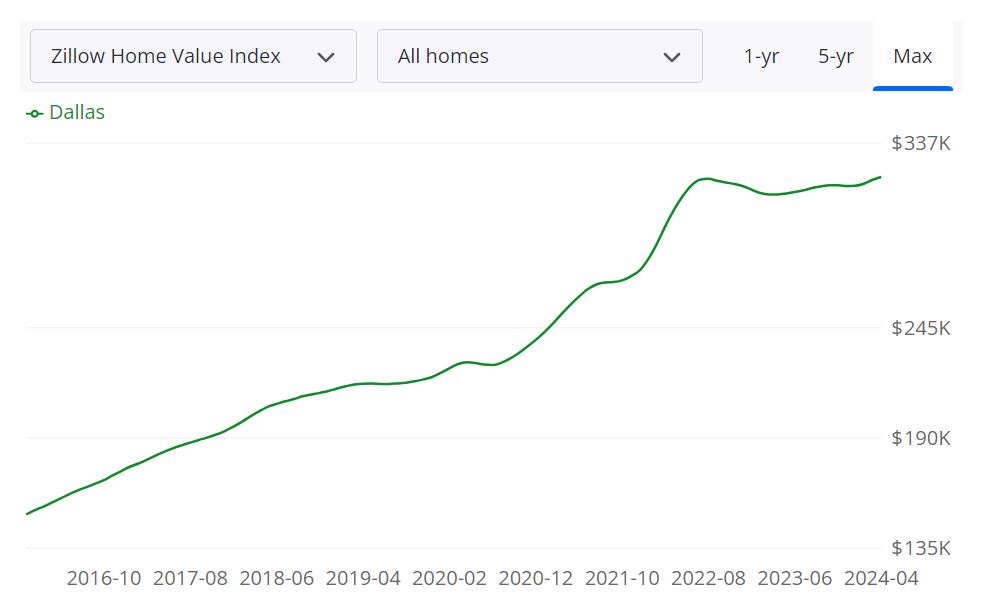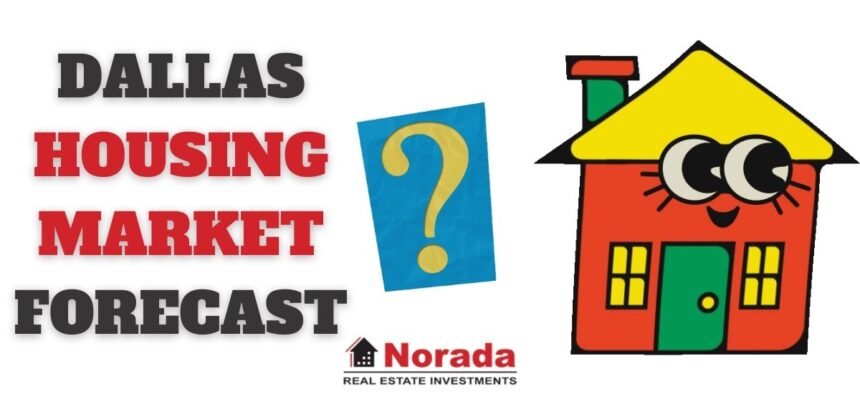Dallas boasts a dynamic housing market compared to other Texas cities. Fueled by a robust job market and a healthy commercial sector, the city attracts a steady stream of newcomers. However, diving into this market requires understanding current trends.
Unlike some Texas cities, Dallas leans towards a competitive market, so be prepared for potential bidding wars. This article unpacks everything you need to know about the Dallas housing market, including home values, key trends, and valuable insights for buyers and sellers.
So, How is the Dallas Housing Market Doing in 2024?
It is a leaning seller’s market, but with rising inventory, it’s becoming more balanced. The market is showing healthy growth with rising prices and strong sales, but a slight rise in inventory suggests a more balanced market.
Let’s dive into the latest data to understand current trends and what they might mean for you.
Strong Sales and Rising Prices
Overall, the DFW housing market is experiencing healthy growth. Single-unit residential housing saw an 8.09% year-over-year increase in sales volume, with 8,695 transactions closing in the recent period. This translates to a total dollar volume of $4.39 billion, a significant jump from the previous year’s $3.95 billion.
The data also reveals a rise in prices. The average sales price climbed 3% to $505,446, while the median price edged up 1.5% to $405,000. This indicates that not only are more homes selling, but buyers are also willing to pay more for them. This trend is consistent with the national housing market, which has seen steady price growth in recent years.
Single-Family Homes: A Closer Look
Single-family homes, a popular choice for many buyers, mirrored the overall market trends. Sales volume increased by 8.38% year-over-year, with 8,069 transactions closed. The dollar volume also rose to $4.14 billion, reflecting a growing market.
The average sales price for single-family homes inched up by 2.67% to $513,563, while the median price grew slightly more at 2.92%, reaching $411,695. These figures suggest that while there’s an increase in buyer activity, affordability remains a concern, with the median price hovering above the $400,000 mark.
Inventory and Market Speed
An interesting shift is happening with inventory levels. Months of inventory, which represents how long it would take to sell all currently listed homes at the current sales pace, has risen to 3.2 months for single-unit residential housing and 3.1 months for single-family homes. This indicates a slight increase in available properties compared to the previous year.
However, despite the rise in inventory, the market remains active. Days to sell have actually decreased, dropping to 80 days for single-unit residential housing and 79 days for single-family homes. This suggests that homes are still moving relatively quickly, indicating a healthy balance between supply and demand.
Job Market Strengthens Market
The D-FW area boasts a robust job market, which is a significant driver of the housing market’s strength. The latest figures from the Texas Workforce Commission show a 1.79% year-over-year increase in jobs, bringing the total to 4,278,100. This job growth, averaging 6% annually over the past five years, creates a positive environment for potential homebuyers who are looking for employment opportunities.
What Does This Mean for You?
The DFW housing market offers promising opportunities for both buyers and sellers. If you’re a buyer, be prepared for a competitive market and do your research to find a home that fits your budget. Working with a qualified real estate agent can be invaluable in navigating the process.
For sellers, the current market conditions present a good opportunity to list your property. However, with the slight rise in inventory, it’s crucial to price your home competitively to attract buyers quickly. Consulting with a realtor can help you determine the right listing price to maximize your return.
The DFW housing market is expected to remain stable throughout 2024. While interest rates may fluctuate, the job market’s strength is likely to continue fueling buyer demand. Staying informed about market trends and consulting with a real estate professional will be key to making informed decisions, whether you’re buying or selling a home in the DFW area.
Dallas Real Estate Appreciation Over the Years
If you’re considering buying a home in Dallas, you’re likely interested in the city’s housing market trends. Here’s some good news: Dallas has been a top performer in real estate appreciation over the past decade. Let’s dive into the numbers and see what they tell us.
A Decade of Strong Growth
Over the last ten years, Dallas has enjoyed some of the highest home appreciation rates in the country. The total appreciation for that period sits at an impressive 121.62%, translating to an average annual increase of 8.28% (neighborhoodscout). This puts Dallas in the top 20% nationwide for real estate growth – a great sign for homeowners and investors alike.
While the most recent quarter shows a slight dip, it’s important to remember that real estate markets can fluctuate. Looking at the bigger picture, the longer-term trends paint a very positive story. Over the past two and five years, Dallas has seen significant appreciation, solidifying its position as a strong market. Consistently ranking in the top three for appreciation across various timeframes, Dallas stands out as a market that has consistently delivered impressive returns.
What Does This Mean for You?
This data suggests that Dallas real estate has historically been a sound investment. If you’re looking for a place where your home value has the potential to grow steadily, Dallas is definitely worth considering. However, it’s important to remember that past performance is not always a guarantee of future results.
While appreciation is a key factor, it’s not the only thing to consider when buying a home. Dallas offers a vibrant job market, a diverse and exciting culture, and a variety of neighborhoods to suit different lifestyles. These factors all contribute to the city’s desirability, which in turn fuels the real estate market.
The Takeaway
Dallas has a proven track record of strong real estate appreciation. While short-term fluctuations can occur, the long-term trends are positive. If you’re interested in buying a home in a dynamic city with a growing economy, Dallas is a market that deserves your attention. Remember, consulting with a qualified real estate professional can help you navigate the specific details of buying a home in Dallas and ensure you make an informed decision.
Dallas Housing Market Predictions 2024
The Dallas housing market has been a scene of steady growth in recent years. With a median sale price hovering around $399,108 (Zillow) and homes flying off the shelves in an average of 17 days (as of March 2024), it’s no surprise many are wondering – what’s next for Dallas real estate? Buckle up, because we’re diving into market predictions for the rest of 2024 and 2025.
A Look at the Numbers:
- Solid Price Growth: The average Dallas home value has risen 2.8% year-over-year, indicating a consistent upward trend.
- Competitive Landscape: The median sale to list ratio sits at a near-perfect 0.987, suggesting a market where buyers are willing to pay close to asking price.
- Seller’s Market: While some homes sell under list price (59.2%), a significant portion (20.4%) goes above, indicating a market tilted in favor of sellers.
What the Forecast Holds:
Now, let’s dissect the provided Metropolitan Statistical Area (MSA) forecast for Dallas:
- May 2024: A slight uptick of 0.1% is predicted for DFW, suggesting continued price stability.
- July 2024: A small dip of 0.1% is expected, possibly indicating a seasonal slowdown.
- 2025: A more substantial decline of 0.9% is forecasted for the end of 2025. This could signal a shift towards a more balanced market.
Crash or Boom?
The short answer: neither. The forecast suggests a potential cooling off rather than a dramatic crash. Here’s why:
- Strong Underlying Economy: Dallas boasts a robust economy with a diverse job market, which is a major driver for housing demand.
- Limited Inventory: The current market lacks a surplus of homes, which helps maintain price stability.
What to Expect:
While a price correction is a possibility in 2025, it’s unlikely to be a significant one. Here’s a more likely scenario:
- Slower Pace of Appreciation: The double-digit growth rates seen in recent years might ease up.
- More Balanced Market: Bidding wars may become less frequent as inventory levels rise slightly.
The Final Word:
The Dallas housing market appears to be headed for a period of moderate growth, with a potential shift towards a more balanced market in the future. So, is it a good time to buy? It depends on your individual circumstances. If you’re looking for a stable investment and plan to stay in the home for a while, Dallas might still be a good option. However, if you’re expecting explosive price appreciation, the market might cool down a bit.
As depicted in this graph (Zillow), home values have increased year-over-year. This upward trend is expected to persist, with forecasts indicating continued growth over the next year.

Should You Invest in the Dallas Real Estate Market?
Is Dallas a Good Place For Real Estate Investment? The Dallas-Fort Worth (DFW) metroplex is a booming region in Texas, consistently ranking high on lists of attractive real estate investment markets. But is it the right choice for you? Here’s a detailed breakdown of key factors to consider:
City’s Population Growth and Trends
- Rapid Growth: Dallas is experiencing explosive population growth. Fueled by a strong job market and affordable living costs, the metroplex is projected to add over one million residents by 2030 [Dallas Business Journal]. This translates to a constant demand for housing, benefiting both rental and sales markets for investors.
- Diverse Demographics: The DFW population is young and diverse, with a millennial-heavy demographic. This group typically fuels the rental market as they prioritize flexibility and affordability over immediate homeownership. Millennials are also known for their entrepreneurial spirit, further contributing to the area’s economic dynamism.
Economy and Jobs
- Strong Job Market: Dallas boasts a diversified economy with a strong presence of healthcare, finance, and technology industries. This translates to job security and a steady influx of professionals seeking quality housing, bolstering rental markets. The Dallas-Fort Worth (DFW) metropolitan area had a 6.5% job growth rate in February 2024, which was higher than the national average of 1.7%. This growth was driven by gains in manufacturing, financial activities, and leisure and hospitality. In 2023, the DFW metroplex added more than 154,000 new jobs, which was the second-highest number in the country after New York City.
- Corporate Relocation Hub: Major corporations are increasingly choosing Dallas for their headquarters or regional offices. This trend in corporate relocation further strengthens the job market and creates a consistent demand for housing. Companies like Toyota North America and Topgolf have recently made the move to DFW, highlighting the region’s attractiveness to businesses.
Livability and Other Factors
- Business-Friendly Environment: Texas is known for its low taxes and business-friendly regulations, making it an attractive location for entrepreneurs and established companies alike. This fosters economic growth and a stable environment for real estate investment.
- Relatively Affordable Living: While home prices have risen in recent years, Dallas remains more affordable compared to other major coastal cities. The cost of living in Dallas is significantly lower than in places like San Francisco or Los Angeles. This affordability continues to attract residents and renters, creating a healthy and dynamic housing market.
- High Quality of Life: Dallas offers a high quality of life with a vibrant culture, diverse neighborhoods, and a range of entertainment options. The Dallas Arts District is a major hub for cultural attractions, while trendy neighborhoods like Deep Ellum offer a lively nightlife scene. This attracts residents and renters seeking a well-rounded lifestyle, boosting the overall demand for housing.
Rental Property Market Size and Growth
- Large and Growing Market: The Dallas rental market is vast and flourishing. With a high percentage of residents choosing to rent, investors can find a wide variety of properties with strong rental potential. The dominance of the rental market can be attributed to several factors, including the young and transient nature of the population, and the affordability advantage of renting compared to buying in a market with rising home prices.
- Favorable Rental Yields: Dallas offers competitive rental yields compared to the national average. This means investors can expect a healthy return on their investment through rental income. Yields can vary depending on property type, location, and overall market conditions, so careful research is crucial.
Other Factors Related to Real Estate Investing
- Market Shift: As of May 2024, the Dallas market is transitioning from a seller’s market to a buyer’s market. This presents an opportunity for investors to potentially negotiate better deals and acquire properties at a more favorable price point. A buyer’s market can also mean more time to conduct due diligence and research potential properties.
- Rising Interest Rates: The recent rise in interest rates can impact investor calculations. Higher interest rates can increase financing costs and potentially lower profit margins. However, Dallas’ strong fundamentals and potential for appreciation, along with the possibility of a more balanced market, can still make it a worthwhile investment. Investors with strong financial reserves and long-term investment horizons may be better positioned to weather short-term fluctuations in interest rates.
Remember: Real estate investing involves inherent risks. Conduct thorough research, consider your financial goals, and consult with a qualified financial advisor before making any investment decisions. By carefully weighing the factors outlined above, you can make an informed decision about whether investing in the Dallas real estate market aligns with your investment strategy.
ALSO READ:
Should You Invest in the Dallas Real Estate Market?
Texas Housing Market 2024: Trends and Predictions
Will the Texas Housing Market Crash in 2024?
Is Texas a Good Place to Live: Explore the Cost, Jobs & Lifestyle











